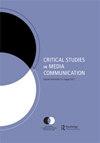我们从哪里来,到哪里去:编辑们的介绍
IF 1.5
2区 文学
Q3 COMMUNICATION
引用次数: 0
摘要
关于COVID-19大流行的深远影响,有很多可以说的:对美国和国外民主的无处不在的威胁;反犹太主义、种族主义和白人至上主义暴力在全球激增;有争议的2020年美国总统大选的后果正在逐步显现;以及反lgbtqia +法案、政策和法律的恶毒上升。我们的文化景观日益以两极分化和分裂为特征,提供了大量的反思、质疑、哀悼和抵制。然而,也有希望和社会变革的曙光照亮了我们前进的道路。Z世代已经证明自己在利用社交媒体提高气候变化意识和影响政策方面非常有效;包括ChatGPT在内的人工智能有可能为人类一些最古老的问题提供新的解决方案;土著和有色人种女性电影人讲述的故事继续得到重视。把我们的注意力转向内部,全国传播协会(NCA)已经把一开始值得庆祝的光辉时刻变成了重塑我们学科的物质成就。最重要的是莎莉·迈尔斯-科恩博士作为NCA执行董事的竞争选择,她是第一位担任这一职务的非裔美国女性。自2013年IDEA委员会成为执行领导结构的一部分以来,NCA在整个组织中不断提升其包容性、多样性、公平性和可及性(IDEA)的优先级。最近的努力包括纠正排他奖励做法,欢迎三个新的核心小组作为利益集团(加勒比通讯;本土的;以及西南亚/北非、中东),并进一步使其期刊编辑和编辑委员会多样化。期刊编辑和编委会中缺乏交叉多样性可以追溯到NCA 12种期刊中的11种的起源。在2021年IDEA特别工作组报告中,NCA通过1988-1990年平权行动语音交流协会特别工作组正式承认了我们学科出版过程中的排他性障碍。2018年,学者维权人士再次呼吁消除阻碍有色人种和其他被边缘化群体学者申请和/或获得这些职位的结构性障碍(《包容、多样性、公平和准入战略规划工作组》[IDEA], 2022a,第1页;另见IDEA, 2022b)。NCA的最新期刊《沟通与种族》承认并指出,我们的学科需要“抵制对学者和奖学金相关人士的持续排斥”本文章由计算机程序翻译,如有差异,请以英文原文为准。
From whence we came and where we are going: the editors’ introduction
Much can be said about the far-reaching impact of the COVID-19 pandemic: omnipresent threats to democracy in the U.S. and abroad; global surges of anti-Semitic, racist, and white supremacist violence; steadily unfolding consequences of the contentious 2020 U.S. presidential election; and nefarious upticks in anti-LGBTQIA+ bills, policy, and laws. Increasingly characterized by polarization and fragmentation, our cultural landscape offers a great deal to reflect upon, question, mourn, and resist. Yet, there are also glimmers of hope and societal transformation lighting our path forward. Gen Z has proven itself highly effective at utilizing social media to raise climate change awareness and impact policy; artificial intelligence, including ChatGPT, has the potential to generate new solutions to some of humanity’s oldest problems; and the stories told by Indigenous and women of color filmmakers continue to gain prominence. Turning our attention inward, the National Communication Association (NCA) has transformed what began as shining moments worthy of celebration into material achievements that re/shape our discipline. Foremost is Dr. Shari Miles-Cohen’s competitive selection as NCA’s Executive Director, the first African American woman to serve in this role. Since 2013, when the IDEA Council became part of the executive leadership structure, NCA has consistently leveled up its prioritization of inclusion, diversity, equity, and access (IDEA) throughout the organization. Recent efforts include remedying exclusionary awards practices, welcoming three new caucuses as interest groups (Caribbean Communication; Indigenous; and South West Asian/North African, Middle East), and further diversifying its journal editorships and editorial boards. The lack of intersectional diversity represented among journal editors and editorial boards can be traced back to the origination of 11 of NCA’s 12 journals. Recounted in the 2021 IDEA Task Force Report, NCA formally acknowledged exclusionary barriers in our discipline’s publication processes via the 1988–1990 Speech Communication Association Taskforce on Affirmative Action. In 2018, scholar–activists led a renewed call to remove structural barriers that discourage scholars of color and Others who identify with marginalized populations from applying and/or earning these appointments (Inclusion, Diversity, Equity, and Access Strategic Planning Task Force [IDEA], 2022a, p. 1; see also IDEA, 2022b). NCA’s newest journal, Communication & Race, acknowledges and addresses our discipline’s need to “counteract the ongoing exclusions of scholars and scholarship related
求助全文
通过发布文献求助,成功后即可免费获取论文全文。
去求助
来源期刊

Critical Studies in Media Communication
COMMUNICATION-
CiteScore
2.10
自引率
0.00%
发文量
34
期刊介绍:
Critical Studies in Media Communication (CSMC) is a peer-reviewed publication of the National Communication Association. CSMC publishes original scholarship in mediated and mass communication from a cultural studies and/or critical perspective. It particularly welcomes submissions that enrich debates among various critical traditions, methodological and analytical approaches, and theoretical standpoints. CSMC takes an inclusive view of media and welcomes scholarship on topics such as • media audiences • representations • institutions • digital technologies • social media • gaming • professional practices and ethics • production studies • media history • political economy. CSMC publishes scholarship about media audiences, representations, institutions, technologies, and professional practices. It includes work in history, political economy, critical philosophy, race and feminist theorizing, rhetorical and media criticism, and literary theory. It takes an inclusive view of media, including newspapers, magazines and other forms of print, cable, radio, television, film, and new media technologies such as the Internet.
 求助内容:
求助内容: 应助结果提醒方式:
应助结果提醒方式:


